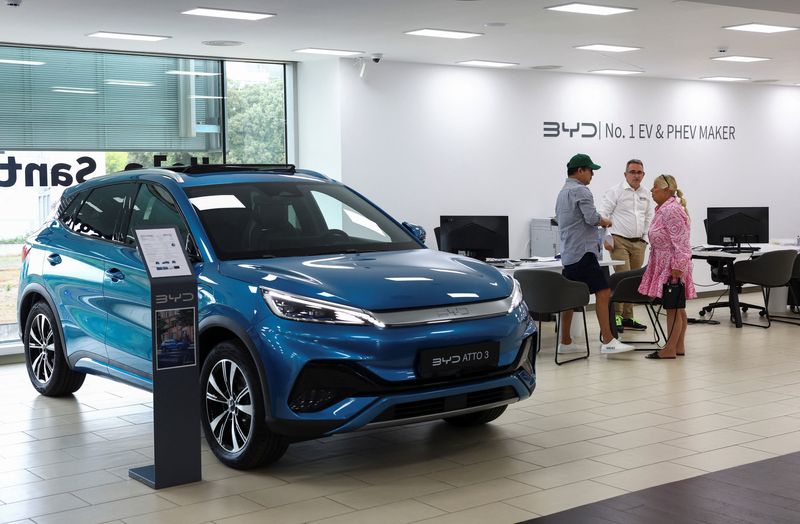China’s BYD makes gains in Spain with low EV prices, fast expansion
By Alessandro Parodi and Javi West Larrañaga
BARCELONA (Reuters) -When Javier Hernandez went car shopping in Barcelona, he ended up choosing a plug-in hybrid by China’s BYD – swayed by a price nearly 10,000 euros cheaper than European rivals.
The 51-year-old Spanish excavator operator wanted something cheap and versatile for city drives and trips to the Catalan mountains, but had doubts about Chinese electrified cars as he didn’t know the brands well.
With government subsidies, the BYD Seal U DM-I Hernandez opted for starts at around 30,000 euros ($35,289) in Spain, compared to over 40,000 euros for VW’s Tiguan and Peugeot’s 3008 plug-in hybrid models.
“The value for money was better, I tried it out and they could give it to me right away,” he told Reuters.
CHEAPER CARS, MORE DEALERSHIPS
Cost-conscious buyers like Hernandez are fuelling rapid growth for Chinese EV carmakers like BYD in Spain and around Europe, stepping up competition with regional and U.S. rivals like Tesla, Stellantis and Volkswagen.
“Until the arrival of BYD, if you wanted to buy an electric vehicle, you had to spend a hell of a lot of money,” BYD country manager for Spain and Portugal Alberto De Aza told Reuters.
BYD’s Spanish dealership network has nearly quadrupled to almost 100 dealers from 25 last year, De Aza said, accompanied by aggressive marketing and discounts.
Meanwhile, most established car brands have closed dealerships. Data from Faconauto shows legacy brands had 1,648 dealerships in 2024, down from 2,164 a decade ago. Volkswagen and Audi dealerships fell 40% in that period.
“Chinese competitors are increasing the pressure, and not just on us,” Markus Haupt, interim CEO of Volkswagen-owned SEAT told Reuters last week.
CHINESE EV SURGE IN MARKET SHARE
BYD’s share of Spain’s EV market, including fully-electric models and plug-in hybrids (PHEVs), climbed to more than 10% in Spain in July despite EU tariffs on Chinese-made EVs. That’s more than double its European average and three times Tesla’s 3.3%.
Its share of Spain’s total car market has risen to 1.8% through August from 0.3% last year, surpassing brands like Stellantis’ Jeep or Volvo, data by industry group ANFAC shows. The Seal U is Spain’s most popular plug-in hybrid so far this year.
Still, it trails behind top selling brands like Toyota, Renault and Volkswagen.
SPAIN: A GATEWAY FOR EXPANSION
Spain’s lack of a national automotive champion makes it fertile ground for Chinese expansion, analysts say.
“It doesn’t have a strong local carmaker,” said Felipe Munoz, analyst at JATO Dynamics, adding that SEAT had lost some of its Spanish identity having been bought by Germany’s VW and looked the most exposed.



Leave a Comment
Your email address will not be published. Required fields are marked *